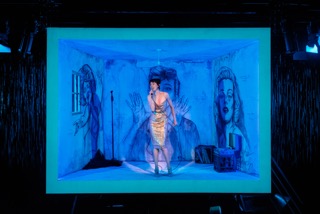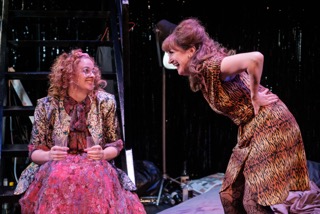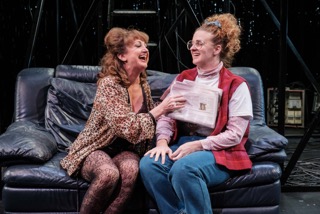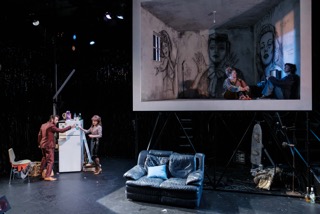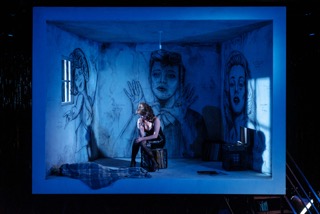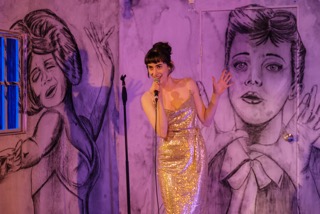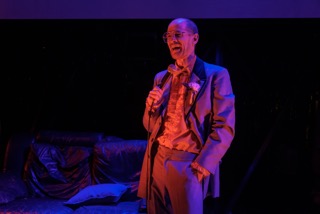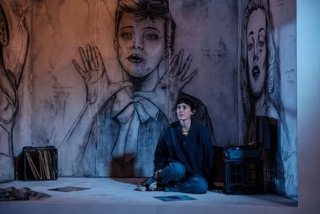Review: The Rise and Fall of Little Voice
- Feb 8, 2019
- 3 min read
By Fred Pryce
The Rise and Fall of Little Voice, a stunning new production of Jim Cartwright’s acclaimed 1992 play, shines in its contradictions. It’s about escape and escapism in a world full of snares, pitting the kitchen-sink miserablism of Northern England against blissful tastes of the surreal and sublime, though perhaps the greatest contradiction is Little Voice herself (or L.V.). Quiet and stuttering to the point of non-communication, she hides in an enclosed room above the stage, losing herself in her dead father’s extensive record collection of 20th century divas, Judy Garland and Marilyn Monroe emblazoning the walls. The story feels as fairy tale, more than that, she’s learned to impersonate them to the point of verisimilitude, her voice disappearing into theirs—an apt metaphor for the hidden anxieties plaguing so many performers. The story is as timeless as a fairy tale, balancing the real and fantastical, and director Shaun Rennie describes her escape room as echoing a tower cell. L.V. is hiding up there from her mother, a thundering, chattering whirlwind of a woman that swoops around their crumbling home in leopard-print gowns, usually drunk. When her seedy new boyfriend Ray Say (“his tongue… half-razor, half-raspberry”) discovers L.V., he promises to take her to the top—though it feels like a threat.
The casting of Caroline O’Connor as the mother, Mari Hoff (or, humorously, Mrs. F. Hoff), is particularly canny, given her own sizable reputation as a modern Australian diva. She completely sinks into the part, physically dominating the stage and constantly spitting out crude witticisms like second nature (“I had that feeling in me twat-bone… and I can predict rain with that”). She’s horrific and hilarious, by turns monstrously abusive towards L.V. and dismissive of her talent, then pitiful as her voice quavers with desperation, then uproariously funny as she burns with sexual voracity. It’s a tour de force performance that never verges into the outright grotesque, a testament to the production’s remarkable empathy for its characters. It’s also through Mari that Cartwright’s writing comes to the fore, churning local slang and whimsical patter together delightfully, in a way that elevates the dialect of working-class characters into something magical, without condescension or romanticisation. Cartwright’s knack for wordplay means the beats of a familiar star-is-born story are always entertaining.
Standing equal to O’Connor is Geraldine Hakewill, whose portrayal as the unassuming L.V. is heart-wrenching, ranging from extreme introversion to brassy belting. Her renditions of diva classics are jaw-droppingly uncanny even as she with simultaneously trembles with fear, and when her powers are fully unleashed, she is quite literally dazzling. Credit must go to the entire design team for molding the stage around her presence, blaring neon tubes like weapons to disorient us, lighting her little box like neon retro TV as she sings, and scattering drab furniture like litter. It lends theatrical spectacle to searing psychodramatic confrontations, and perfectly sets the magical-realist tone.
It’s a dark fable about yearning for something over the rainbow, doubling as an intimate, rousing musical-comedy. It’s a simple call to just be yourself, with a sly warning attached. Or, as it more eloquently puts it, “the meek shall inherit the earth… when though?”
Photo Credit: Robert Catto
Running until Feb 24th, tickets are available here
All opinions and thoughts expressed within reviews on Theatre Travels are those of the writer and not of the company at large.
